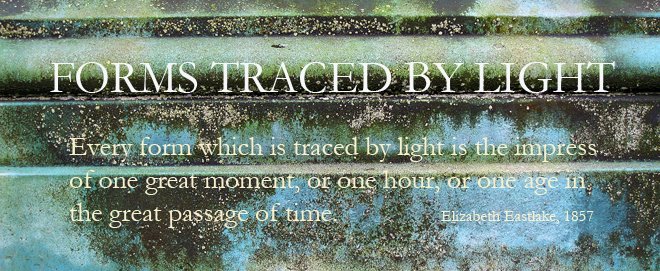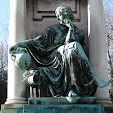
This sullen form seems much more convincing as a knight than yesterday's tacky object - though he's far from red. The silver knight stands at the exit of the Rutgers Club, presumably to exhort valor and fortitude from those who've just attended a two-hour Academic Leadership Session. My sense of the medieval, though, received a booster in a positive - rather than cynical - direction this morning, though, when one of my 8.10 a.m. students, Emily K, recited from memory the first 20 lines of the General Prologue to the Canterbury Tales, and did so quite beautifully, and with a stunningly convincing accent (without putting on the Special, I-am-Now-Reciting-Medieval-Poetry voice beloved of some of my former Oxford colleagues). And this reminded me that not only did I really enjoy medieval literature, but that what I most liked about it had nothing to do with knights and jousting and quests and holy grails and other things beloved by both Tennyson and Monty Python, but I loved the sense of quiet tragedy that it could give: the sense of the world's brittleness and fragility and transience. Because of this Chaucer, for me, is at his best not in the Canterbury Tales, good fun though they are, but in the amazing Troilus and Criseyde. Here's Criseyde musing on the friable nature of happiness, which itself is a highly unstable state. Either one recognizes that it may change and pass, or one doesn't: if one doesn't, she maintains, then one can't really be happy. But what (Chaucer's getting us to consider) does happiness mean, if built up within it is a sense of its mutability?
`O brotel wele of mannes Ioye unstable!
With what wight so thou be, or how thou pleye,
Either he woot that thou, Ioye, art muable,
Or woot it not, it moot ben oon of tweye;
Now if he woot it not, how may he seye
That he hath verray Ioye and selinesse,
That is of ignoraunce ay in derknesse?
I have the feeling that Rutgers-style knights don't seem much troubled by such sentiments: maybe I'd feel more
sympathetic towards them if they were more like Criseyde's (temporary) partner, Troilus - who ends up deeply
unhappy, since joy (and, alas, Woman) proves transient indeed.


No comments:
Post a Comment